Key takeaways:
- Creating a detailed timeline with a checklist helps manage wedding logistics and reduces stress.
- Effective communication with vendors and the wedding party is essential for a smooth experience.
- Choosing reliable vendors who align with your vision can significantly enhance your wedding day.
- Being adaptable to unexpected changes can lead to memorable and cherishable moments.
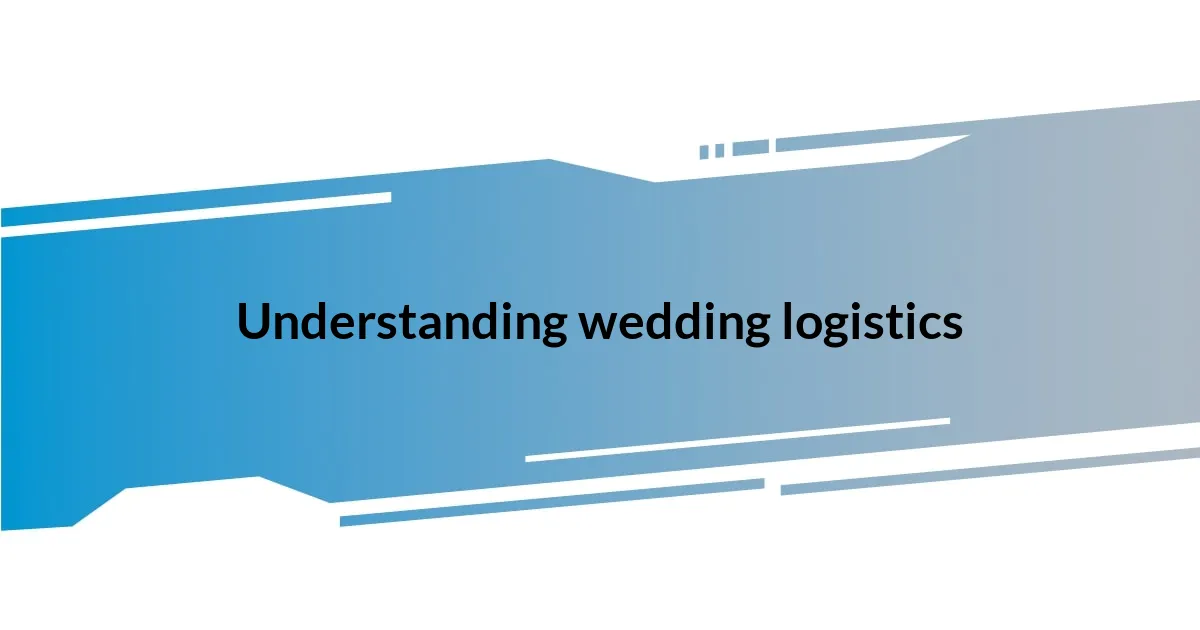
Understanding wedding logistics
Wedding logistics can often feel like piecing together a complex puzzle. I’ll never forget the day I had to coordinate the delivery of flowers, catering, and the arrival of the bridal party—all within a two-hour window. It made me wonder: how can such a joyful occasion come with a sprinkle of stress?
In my experience, having a detailed timeline helped tremendously. I created a checklist and marked each task along with the estimated time frame. This approach transformed my overwhelming to-do list into manageable bites; suddenly, I felt like I had control over the chaos. Have you ever thought about how a solid plan could make the difference between anxiety and enjoyment on one of the happiest days of your life?
Communication is another crucial element that cannot be overlooked. I learned the hard way that having everyone—vendors, family, and the wedding party—on the same page was essential. During one chaotic moment, my phone became my lifeline; a quick text to the coordinator sorted out a last-minute transportation issue. It’s these connections that can elevate your wedding from stressful to truly memorable.
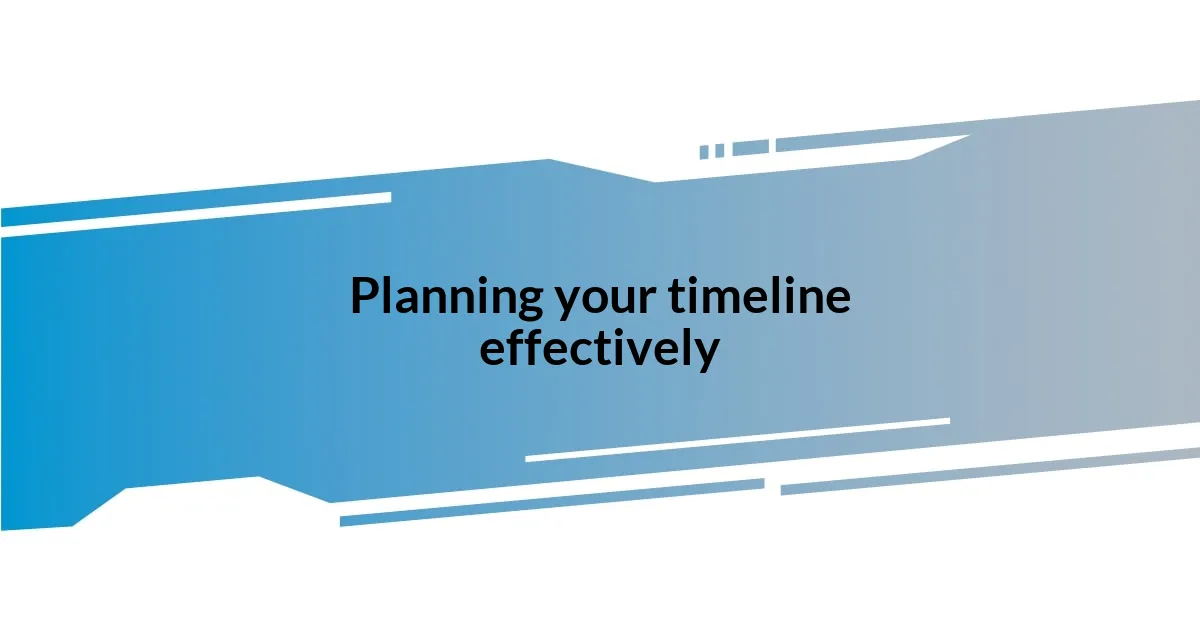
Planning your timeline effectively
Crafting your wedding timeline can seem daunting, but breaking it down into smaller chunks helps alleviate that pressure. I remember sitting at my kitchen table with a colorful calendar and a glass of wine, mapping out every detail for my big day—it felt both empowering and a tad bit exhilarating. I scheduled everything from hair and makeup to the first dance, allowing buffer time to accommodate any unexpected delays. It was like orchestrating a symphony, where every note had to be perfectly timed.
Here are some key points I found effective in planning my timeline:
- Start with the ceremony time: Work backwards from this to ensure you allocate enough time for hair, makeup, and any travel.
- Incorporate vendor arrival times: Notify vendors of the timeline so they can plan their arrival accordingly.
- Schedule buffer periods: Life is unpredictable; adding extra time helps manage unexpected hiccups.
- Communicate with your wedding party: Keep everyone informed about what’s happening and when; it helps reduce confusion and stress.
- Review and revise: Go over the timeline multiple times leading up to the wedding; changes may occur that require adjustments.
By embracing this structured approach, I found that the wedding day flowed more smoothly, allowing me to soak in the joy rather than stressing over logistics. There’s a certain magic in seeing everything come together as planned, especially when family and friends come together to celebrate.
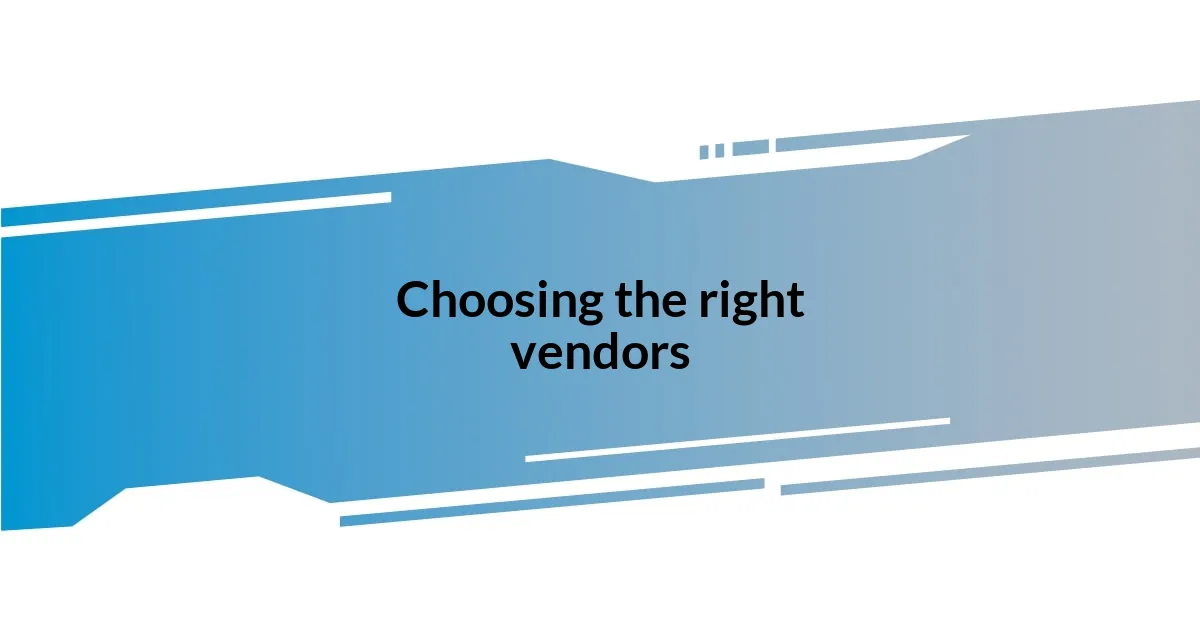
Choosing the right vendors
Choosing the right vendors can make or break your wedding day. I remember standing in a beautifully decorated venue, completely enamored with the florals but realizing that it was their meticulous vendor choices that turned a simple room into a magical space. When selecting vendors, I recommend focusing on those who align with your vision and values—this connection can significantly enhance your overall experience.
In my own journey, I had a checklist of qualities I prioritized: reliability, creativity, and good communication. For instance, when I met my caterer, I felt an instant rapport. It wasn’t just about the fantastic food; it was the way they listened to my ideas and genuinely cared about making my vision a reality. This emotional connection not only enabled a smoother collaboration but also filled our wedding with personal touches that truly resonated with my partner and me.
Budget considerations play an important role too. It’s important to balance quality with cost, but I found that investing a little more in reliable vendors often pays off in the long run. Do you ever wonder if the excitement of a wedding budget is worth the stress? In my experience, quality vendors can help you avoid mishaps that could potentially lead to unexpected costs on the day.
| Vendor Type | Key Considerations |
|---|---|
| Caterer | Quality of food, flexibility, tasting experience |
| Photographer | Portfolio style, personality fit, package details |
| Florist | Creativity, understanding of your vision, pricing transparency |
| Coordinator | Experience, communication skills, problem-solving ability |
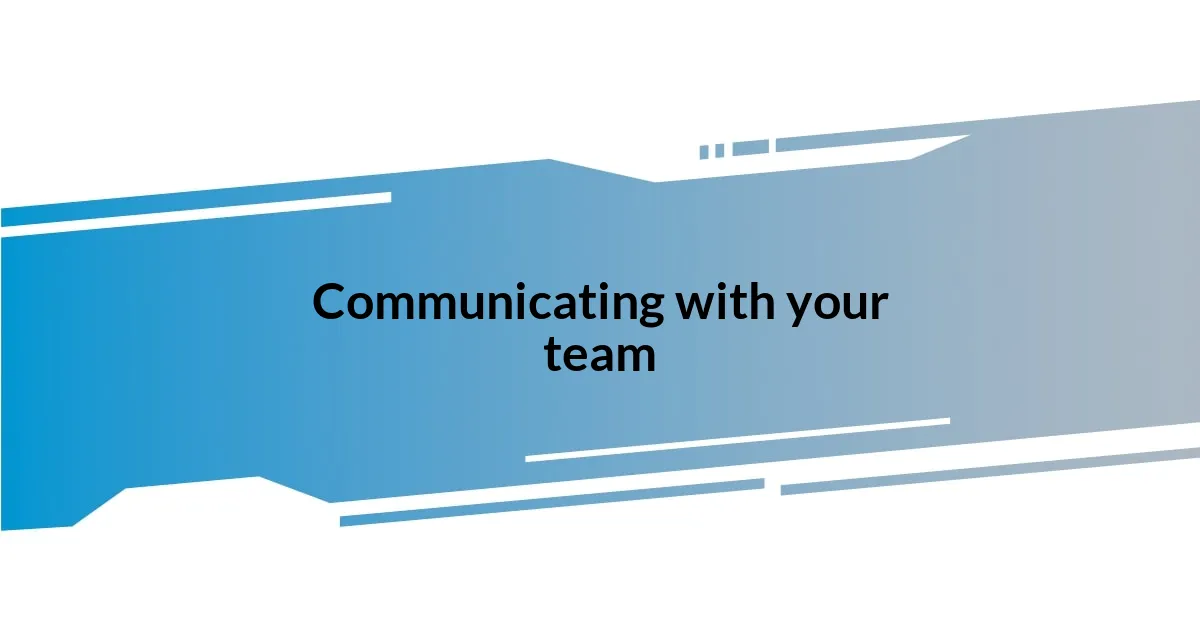
Communicating with your team
Communicating with your wedding team is crucial for ensuring a seamless day. I vividly remember the weekly meetings we had when planning my wedding. We gathered around a table, armed with checklists and a shared vision, which turned our group into a cohesive unit. This regular check-in not only kept everyone on the same page but also built a sense of camaraderie that made the planning process enjoyable.
Text messages, emails, and even a shared group chat kept the lines of communication open. I can’t stress enough how helpful it was to have all vendors connected through a single thread. Whenever questions arose—like when to expect the florist or clarify seating arrangements—I felt like there was always someone to turn to. Plus, it minimized any last-minute confusion and ensured everyone had access to the same information.
But let’s not forget the importance of tone. I learned that conveying enthusiasm and appreciation in my messages made a huge difference. A simple “thank you” after confirming a detail uplifted spirits and fostered positive relationships. Have you experienced a difference in collaboration when communication flows smoothly? Personally, I found that a friendly atmosphere not only made the planning easier but also allowed creativity to flourish among the team, producing memorable moments for our wedding day.
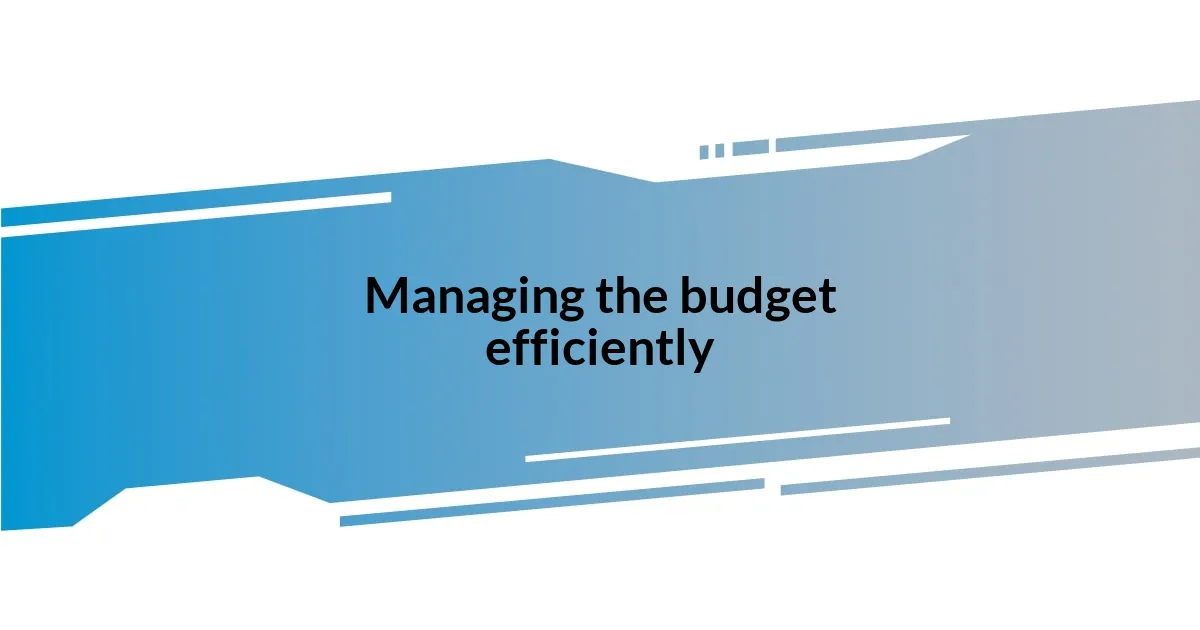
Managing the budget efficiently
Managing a wedding budget can often feel like walking a tightrope. As I sat down with my partner to draft our budget, we quickly learned the importance of prioritizing our must-haves versus nice-to-haves. For example, while my partner was keen on a live band, I was drawn to an upscale venue. We had to blend our visions without breaking the bank. It was eye-opening to see how communicating our priorities led to mutual understanding and a more efficient allocation of funds.
Tracking expenses was another game-changer for us. I set up a simple spreadsheet to monitor what we spent in real-time, which became our trusted guide. This way, we could adjust our spending as needed, ensuring we didn’t run out of money when we still had key items to pay for. How often do we lose sight of how much we’ve spent amid all the excitement? Regularly reviewing our budget helped ground us and kept the planning process less stressful and more focused.
Finally, don’t hesitate to negotiate with vendors. I remember feeling a mix of nervousness and excitement when I approached our florist about pricing. To my surprise, they were very receptive! We were able to discuss package options and find a solution that fit our budget and vision. Have you considered that vendors often have some flexibility? This experience taught me that open dialogue can lead to unexpected savings, making a big difference in laying out your wedding budget effectively.
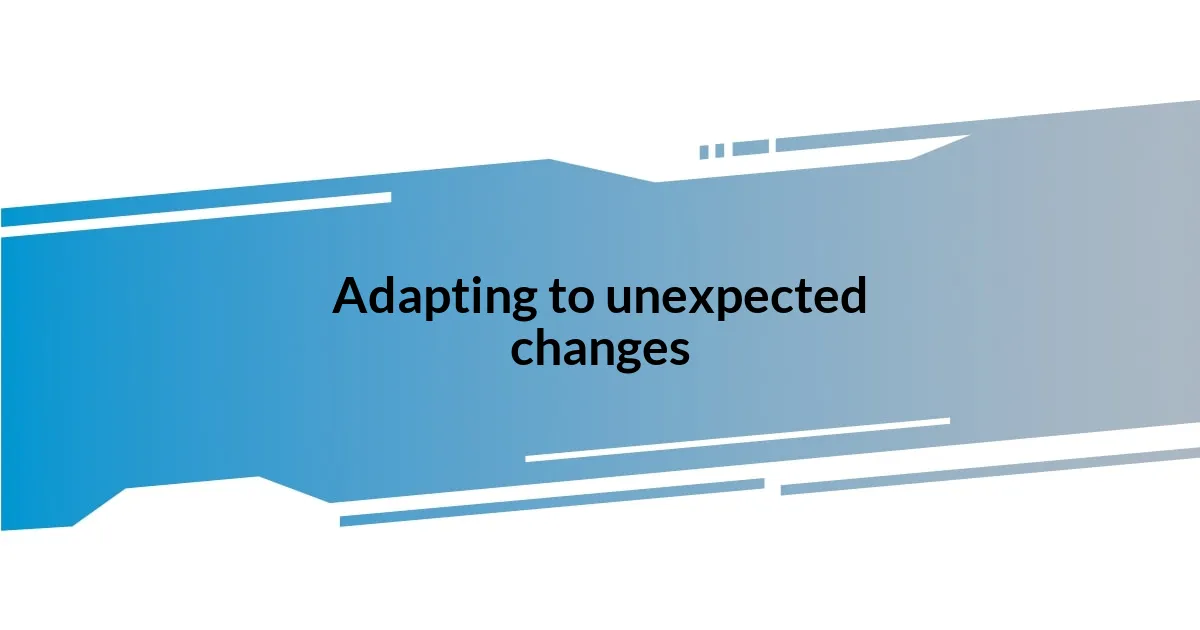
Adapting to unexpected changes
Navigating unexpected changes during wedding planning is something every couple should prepare for. I remember the moment when our venue double-booked our date. My heart sank initially, but I quickly realized it was an opportunity to pivot. With open minds, my partner and I brainstormed alternatives, and we ended up finding a hidden gem that transformed our vision into something even more special. Have you ever found a silver lining in a frustrating situation?
Being adaptable also meant rethinking our timeline. When the hair and makeup team arrived late on the big day, I felt the anxiety creeping in. Instead of panicking, I chose to embrace the chaos. I rallied my bridesmaids for some impromptu photo sessions and laughter filled the room. It reminded me that not everything needs to go according to plan to create beautiful moments. How do you handle those last-minute hiccups?
Lastly, staying positive in the face of change is essential. When the weather unexpectedly turned rainy, we quickly grabbed umbrellas and turned it into a charming part of our day—a whimsical, cozy vibe. I recall seeing guests laughing, sipping hot cocoa, and feeling the warmth of togetherness amidst the raindrops. This taught me that adaptability isn’t just about managing logistics; it’s also about cultivating a mindset that welcomes spontaneity. It’s these unanticipated moments that often become the most cherished memories. How do you keep your spirits high when faced with unexpected twists?
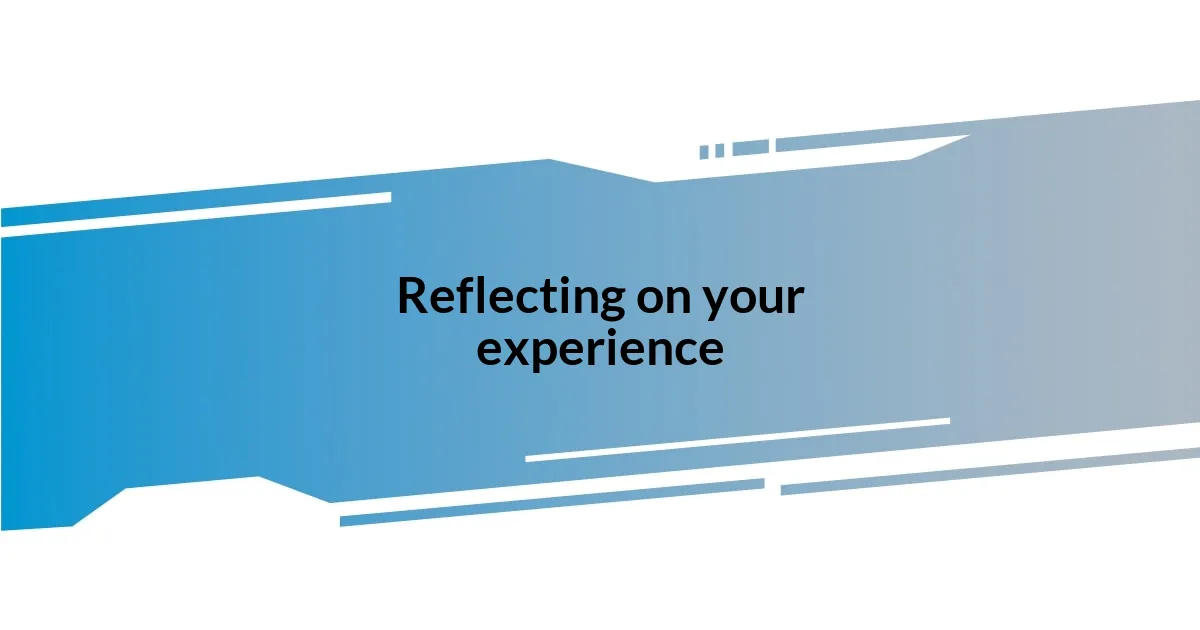
Reflecting on your experience
Reflecting on my wedding experience, I realized how crucial it is to document the journey. Each detail—from vendor conversations to emotional moments—was a lesson in itself. I started keeping a planner filled with notes, capturing not just logistics but also my feelings at each step. When was the last time you paused to appreciate what you’ve achieved in your planning?
Looking back, I see how our communication shaped our experience. My partner and I had honestly heated discussions, but those moments turned into bonding opportunities. For instance, during late-night planning sessions, we often laughed and reminisced about our dating days, which helped ground us. Have you shared those lighter moments with your partner amid all the stress? I found those conversations were just as important as picking a cake flavor.
Lastly, I can’t help but acknowledge how much I learned about myself along the way. I discovered patience I didn’t know I had, especially when delays crept up in our timeline. I remember waiting for our catering response, feeling that familiar knot of anxiety, only to realize that impatience wouldn’t solve anything. How do you deal with the waiting game? For me, it became an opportunity to reflect on the bigger picture and find gratitude in the small milestones we achieved together.